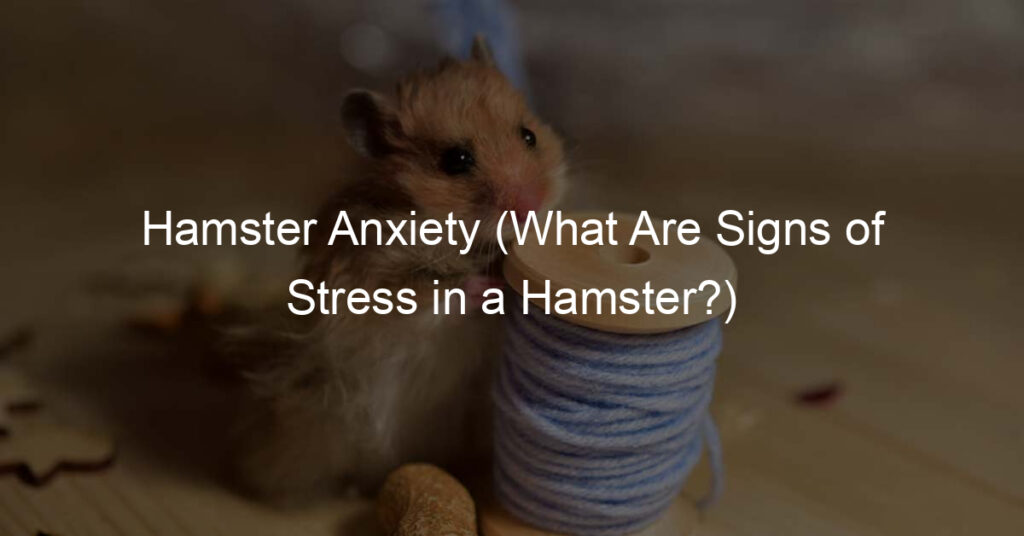Hamsters are cute, fluffy little creatures that can make excellent pets, but like all animals, they can also experience anxiety and stress.
As a responsible pet owner, it’s essential to recognize the signs of stress in your hamster so that you can address the issue and help your furry friend feel more comfortable and happy.
In this blog post, we’ll explore some common signs of anxiety in hamsters and what you can do to help alleviate your hamster’s stress. Whether you’re a seasoned hamster owner or considering getting a hamster for the first time, this is essential information for providing the best care for your pet.
Understanding the Causes of Hamster Anxiety

Understanding the potential causes of anxiety in your hamster is essential so you can take steps to prevent it or address it when it arises. Some common causes of anxiety in hamsters include
- Lack of socialization: Hamsters are social animals and need regular interaction with humans or other hamsters to feel happy and content. If your hamster is isolated for long periods, it may become anxious or stressed.
- Changes in the environment: Hamsters are creatures of habit and may become anxious if their environment is changed too frequently or dramatically. This can include moving their cage to a new location to introducing new objects into their environment.
- Poor diet: Hamsters have specific nutritional needs, and if their diet lacks certain essential nutrients, it can lead to anxiety and other health issues.
- Health problems: If your hamster is experiencing pain or discomfort due to a medical issue, it can cause them to become anxious or stressed.
Having all these facts in place, you can now prevent anxiety in your hamster and ensure that your pet lives in a happy, healthy environment by being aware of its possible causes.
Common Behavioural Signs of Stress in Hamsters

Several behavioral signs may indicate that your hamster is anxious or stressed. These can include
- Changes in activity level: If your hamster becomes more inactive or sluggish than usual, it may signify feeling stressed or anxious. On the other hand, if they become excessively active or hyper, it may also be a sign of stress.
- Changes in appetite: Stress can cause a change in appetite in hamsters, either causing them to eat more or less than usual.
- Changes in grooming habits: Hamsters are known for their fastidious grooming habits, and if your hamster stops grooming itself or becomes excessively grooming, it could be a sign of stress.
- Changes in sleep patterns: Hamsters are nocturnal animals, but if they feel anxious or stressed, they may have difficulty sleeping or sleeping more than usual.
Keep in mind you can tell how your hamster is feeling by observing their behavior and determining whether or not it might be stressed or anxious.
It’s critical to address the situation and make your furry companion feel more at ease if you observe any noticeable changes in your hamster’s behavior.
Physical Signs of Anxiety in Hamsters
In addition to behavioral changes, several physical signs may indicate that your hamster is anxious or stressed. These can include
- Changes in skin and fur: Stress can cause your hamster’s skin to become dry and flaky, and its hair may become dull and matted.
- Weight changes: Stress can cause your hamster to either gain or lose weight, depending on its appetite and metabolism.
- Changes in breathing: Hamsters feeling anxious or stressed may breathe more rapidly than usual.
- Changes in bowel movements: Stress can disrupt your hamster’s digestive system, causing changes in bowel movements.
In a nutshell, you can tell whether your hamster is feeling stressed or anxious by keeping an eye on any changes in their physical appearance. It’s crucial to act to resolve the situation and make your hamster feel more at ease if you detect any worrying changes.
Tips for Reducing Stress in Your Hamster

If you suspect that your hamster is feeling anxious or stressed, there are several steps you can take to help reduce their stress and promote a sense of well-being. Some tips for reducing stress in your hamster include;
- Providing plenty of social interaction
- Creating a calm and consistent environment
- Providing a healthy diet
- Monitoring their health
Putting these tips into practice can lessen your hamster’s stress and create a joyful, healthy environment for your furry pet.
Final Remarks
Hamster owners need to be aware of the potential causes and signs of anxiety in their pets. If you notice any concerning changes in your hamster’s behavior or physical appearance, it’s essential to address the issue and seek the advice of a veterinarian if necessary.
Paying attention to your hamster’s needs and providing the proper care can help your furry friend thrive and enjoy a happy, healthy life.








